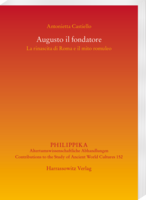|
weitere Titel zum Thema:
Download:
Bitte beachten Sie: Mit digitalen Produkten in Ihrem Warenkorb
wird die Bezahlung nur per PayPal möglich. Der Download dieser Produkte wird bereitgestellt, wenn die Bezahlung bestätigt ist. For Rome and the Romans alike, the Roman civil wars brought about the end of an era. They also reconfigured Roman identity for good. The clash between factions prompted a fratricidal struggle, leading to citizens fighting citizens and to kinspeople killing each other. Anybody could be an enemy, a hostis. Only Octavian was able to put an end to the civil wars and to this climate of universal distrust. He alone could give back to his fellow citizens a history and a purpose in which they could recognise themselves.
Antonietta Castiello shows in her study how Octavian, later Augustus, was able to bring Rome back to life: not physically, but symbolically. Through a juxtaposition never made fully explicit, Augustus managed to enter the hearts of the Romans as their new leader, a charismatic ruler who could easily be assimilated to the Pater Patriae par excellence, Romulus. The revival of the figure of Romulus allowed Augustus and those who recognised in him the leadership of the first founder to breathe new life into the Romans’ legendary past: an intentional history linked to the birth of the city, the creation of its first sacred boundary, the pomerium, and in general to the myth of fratricide, a myth so brutally symbolic that it was open to an Augustan re-interpretation. |
|||||||||||||||||||||||||||||||||||||||






